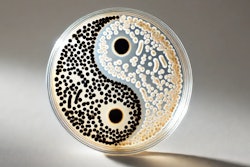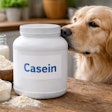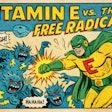
Humans have likely eaten sea lettuce (Ulva rigida) since pre-history. Bladderwrack (Fucus vesiculosus) gained fame as the original source of iodine and now appears on human supplement shelves. A microalga, Chlorella vulgaris, has grown in popularity as a dietary supplement and food source for humans, as well. These three algae may be beneficial to pet health as well.
Farming seaweeds and other algal species have grown in potential as people look to produce more food despite limited arable land. Algae agriculture makes sustainability claims similar to those of insect- and bacteria-based alternative pet food ingredient sources. Algae can grow in self-contained bioreactors. These facilities could be placed in otherwise unproductive sites and potentially use fewer resources than conventional agriculture. Likewise, seaweed grown in the actual sea requires few human inputs and can grow in places no other crops can.
As these algal ingredients move from human supplements into the pet space, researchers tested a blended algal supplement in dog food. The scientists examined the effects of the blend on palatability, intake, digestibility, and the digestive health of adult dogs. They published their results in the journal Algal Research.
The study used a commercial algal blend containing two macroalgae species, Ulva rigida and Fucus vesiculosus, and one microalga, Chlorella vulgaris. Key metrics assessed included palatability, nutrient intake, digestibility, metabolizable energy, and various fecal characteristics, including metabolites and microbiota diversity. Twelve Beagles were used to assess palatability, with six of these dogs randomly selected for further in-depth digestibility trials. The algal blend was tested at three levels of inclusion: 0.5%, 1.0% and 1.5%.
Algal blend influence on dog food palatability and digestibility
Although the dogs showed a preference for the control diet without the algal blend, the inclusion of the algae did not negatively affect the dogs' first approach or initial taste of the diet. Despite preferring the control diet, the dogs' overall intake levels remained stable across the different algal blend levels, suggesting that algal supplements could be integrated without causing a significant reduction in food consumption.
The study found notable improvements in digestibility metrics with the highest level of algal blend inclusion (1.5%). Dogs fed the 1.5% algal-supplemented diet experienced enhanced digestibility of organic matter, fiber and energy compared to those on the lower 0.5% inclusion level. The diet’s metabolizable energy content also increased at the highest level, indicating the algal blend’s potential to improve nutrient absorption and energy utilization.
Fecal characteristics also showed positive responses to the algal blend. The highest level of inclusion led to an increase in fecal short-chain fatty acids (SCFAs), including acetate, which are associated with gut health and energy metabolism. The algal blend-supplemented diet also promoted a higher fecal production rate, reflecting enhanced fiber digestibility.
While the diversity and abundance of fecal microbiota were largely unaffected, certain beneficial bacterial genera, such as Turicibacter and Blautia, remained prevalent across samples. These genera are commonly associated with gut health, and their stability suggests that algal supplementation does not disrupt the balance of gut microbiota in healthy adult dogs.
Overall, the study’s results suggest the algal blend may be a promising supplement for dog food, with benefits in digestibility and fecal quality. This research aligns with the industry’s focus on functional ingredients that promote gut health, an area that continues to interest pet food brands and consumers alike. By enhancing digestibility and energy content without compromising intake, algae-based dog food supplements may help the formulation of both sustainable and nutritionally beneficial recipes.

















